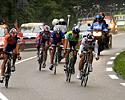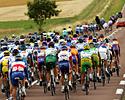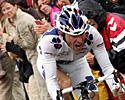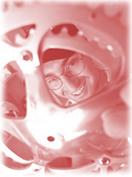
Recently on Cyclingnews.com |
|
|
View from the lab - Ric Stern's Tour de France sports science
British ABCC coach Ric Stern (www.cyclecoach.com) is a regular contributor to Cyclingnews' Form & Fitness section along with being a full time coach. Still an active rider when time allows, Ric will be providing a physiological insight into the challenges that face the riders in the Tour.
July 7: Stage 6 - The dynamics of a breakaway

|
After yesterday's stage, which was dominated by a long break, but which finally came down to a bunch sprint, perhaps today will be the day the long break specialists will succeed? With a rolling stage of 199 km, and four lumpy climbs it's possible that the sprinters maybe a little disadvantaged, especially as the last and hardest climb of the day is only 13.5 km from the finish.
As we saw yesterday, a small break away group is away - currently with a rather large lead. The peloton can afford to let them build such a lead for two possible reasons - 1) the Discovery team want to get rid of the maillot jaune (so that they can save their energy for helping Armstrong in the mountains) and 2) because the riders in the break are likely to fatigue at a faster rate than those in the main peloton - and therefore, the advantage could be wiped out (like yesterday) in the closing kilometres.
The riders aiming for a high overall GC should breeze through today's stage - however, if we see any of the GC riders in trouble on the Cote de Maron at 13.5 km to go then we can likely discount them from the overall - if they can't cope with today's small hills, they certainly won't cope in the Alps and Pyrenees. Once on the climb of the Maron, the riders will have to put in a moderate to big effort (depending on whether they are still chasing the break or have given up for the day). The climb will likely be tackled at an effort similar to that of a time trial. If the GC riders ride at this intensity or harder it will put the other riders in to difficulty. This is because the GC riders average time trial power will be significantly higher than others, or more specifically their power to mass ratio at this intensity will be higher.

|
In the break, the five escapees will be working harder than the majority of the peloton. They'll be riding at an intensity of around lactate threshold to just over time trial intensity. This will depend on the terrain, whether they're on the front and where the winds are coming from. You can 'see' where the wind is blowing from by the 'shape' of the break - are they riding single file (headwind) or staggered diagonal (cross wind).
While the race unfolds, I'll make a few comments about the commentary team's remarks about the black boxes under the saddles of certain riders. As they correctly stated, these are telemetry systems for various heart rate monitors and power meters. On Salvatore Commesso's bike yesterday I spotted a black box, and on his handlebars (and cranks) was the SRM system. Many others were also using this system to transmit power and heart rate data (etc) to their handlebar computers and via the telemetry system to their team managers. Additionally, Floyd Landis and the Phonak squad are using the Power Tap system. The majority of the riders seem to be using Polar heart rate monitors, and much of this data is being transmitted on the television - yesterday, for e.g., I was being told that Cedric Vasseur was riding along at ~ 160 bpm about 5 km out from the finish. Of course, I would later find this out as I receive these HR curves and comment on them at www.tourtotals.com. Of course, it's very interesting to see them live during transmission as well.
Back to the race, and we saw several riders getting dropped today - it's obviously hard going out there today with an up and down parcours and a strong tailwind. Six days in and some of the riders will be getting fatigued. Laszlo Bodrogi has been in several breaks since the Tour started, it's no surprise he's getting fatigued and dropped today.

|
The race starts to splinter on the Cote de Maron; it may only be a fourth category climb, but a hill's a hill and gravity will start to pull you back. You need to be able to ride at a high intensity and have a good power to mass ratio to get over the hills - we can all improve our climbing and time trialling with correct and targeted training. I'll cover that in a later diary, along with explanations of various terms (such as VO2 max). However, the top sprinters made it over in the first peloton and have their teammates chase down the break. It's very close today will Christophe Mengin survive? With a few kilometres to go the riders on the front will be hammering at very high intensity, heart rates will be very high and power output will be too!
Disaster! Mengin crashes on the last corner just after Vinokourov and Bernucci catch him. Alexandre Vinokourov and Lorenzo Bernucci will be hammering at way above their maximal aerobic power. With the sprinters down in the crash and Vino also slowed a little Bernucci takes the stage. There will be some sore riders tomorrow... Let's hope they are all fit to start.
Two days now I've been wrong about the break staying away! Using reverse psychology I'm going for a bunch sprint tomorrow!
2005 entries - the Tour de France
- July 28 - Stage 21 - What it takes
- July 23 - Stage 20 - Getting the TT right - and wrong
- July 22 - Stage 19 - The perfect break
- July 21 - Stage 18 - High intensity and fatigue
- July 19 - Stage 16 - Maintaining an attack
- July 17 - Stage 15 - Tour's biggest day
- July 16 - Stage 14 - Attacks keep coming
- July 15 - Stage 13 - Positive thoughts
- July 14 - Stage 12 - Hot, hot, hot!
- July 13 - Stage 11 - Big efforts uphill
- July 12 - Stage 10 - Number crunching
- July 7 - Stage 6: The dynamics of a breakaway
- July 6 - Stage 5: Coming back after a TT
- July 5 - The TTT - Man, machine and team
Previous Cyclingnews features by Ric Stern
- Winter Training
- Weight training and cycling - The Great Debate
- Power zone training - How to set training levels with a power meter
- Ric Stern also answers Cyclingnews readers' questions in our Form & Fitness Q&A section

